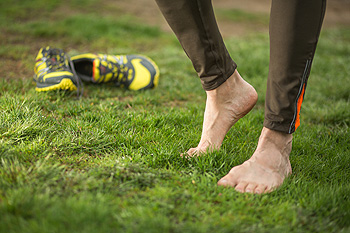When it comes to barefoot running, the consequ ence is in the amount rather than the activity itself. Barefoot running should consistently be treated like a new activity, which means start with a small dose and then progressively increase the distance each time you run. This allows for the body to get better acquainted with the activity and creates a low risk environment. On the other hand, if you don’t pace yourself, then you will become more prone to injuries. It is considered easier to gain proper running form from being barefoot compared to wearing shoes. This is because when you are barefoot, you aren’t prone to some aspects of poor form that present themselves while wearing shoes. When running barefoot, it is easier to take shorter strides in order to reduce impact forces on the lower legs. The most important part of barefoot running is to run by effort and feel rather than pace. This is due to the purpose of barefoot running being to improve efficiency, get stronger and to reduce your risk for injury. It is important when taking up barefoot running that you start off at a comfortable pace, and then slowly build yourself up. If you find yourself interested in this style of running, you should consult with a podiatrist to see if it is a good option for you.
ence is in the amount rather than the activity itself. Barefoot running should consistently be treated like a new activity, which means start with a small dose and then progressively increase the distance each time you run. This allows for the body to get better acquainted with the activity and creates a low risk environment. On the other hand, if you don’t pace yourself, then you will become more prone to injuries. It is considered easier to gain proper running form from being barefoot compared to wearing shoes. This is because when you are barefoot, you aren’t prone to some aspects of poor form that present themselves while wearing shoes. When running barefoot, it is easier to take shorter strides in order to reduce impact forces on the lower legs. The most important part of barefoot running is to run by effort and feel rather than pace. This is due to the purpose of barefoot running being to improve efficiency, get stronger and to reduce your risk for injury. It is important when taking up barefoot running that you start off at a comfortable pace, and then slowly build yourself up. If you find yourself interested in this style of running, you should consult with a podiatrist to see if it is a good option for you.
Barefoot running has grown in popularity in recent years and has been found to offer some benefits over running in shoes. If you are interested in running barefoot, consult with Dr. Michael D. Garvin from Florida. Our doctor will assess your condition and provide you with quality advice and whether barefoot running is right for you.
What Is Barefoot Running?
While running shoes provide excellent support and protection to our feet, they can negatively impact the way we run. Those who run in shoes have been found to be more likely hit the ground with their heels first. This running style has been found to increase the risk of injury from ankle sprains, stress fractures, and Achilles tendinitis. Those who run barefoot tend to land on the balls of their feet which generates less impact.
Benefits of Running Barefoot
Some reported benefits of running barefoot include:
- Less impact on the feet
- Increased sensation and feedback from the feet
- Increased efficiency from less weight from shoes
- Potential for less injury from footwear
- Reported increases in strength to foot and leg muscles
Downsides to Running Barefoot
- Less protection from debris on the ground
- Increased risk of contracting bacterial or fungal infection
- Potential for injuries from overuse
Those with diabetes should avoid barefoot running at all costs. This is due to the risk of sustaining a wound that could become infected. If you do decide to run barefoot, inspect the area you are running in for lots of debris. Furthermore, it is best to start off slow and to not push yourself too hard the first time out, even if you run in shoes regularly. Another substitute for running shoes are minimalist shoes which reduce the weight of shoes but provide better protection.
If you have any questions, please feel free to contact our offices located in Port St. Lucie, FL . We offer the newest diagnostic and treatment technologies for all your foot care needs.
